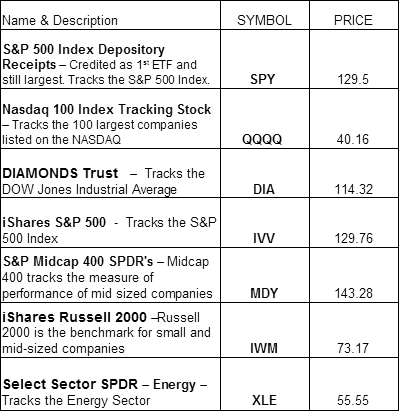
HOT TOPICS LIST
- Strategies
- Stocks
- Buy
- Investing
- Brokers
- Psychology
- Interviews
- Accumulate
- Sell
- Hold
- Spotlight
- Websites
- Candlestick Corner
- Gold & Metals
- Options Trading
LIST OF TOPICS
TRADER'S NOTEBOOK
Adding ETFs To Your Portfolio
05/24/06 11:47:24 AM PSTby John Devcic
Is it time to consider adding exchange traded funds to your portfolio?
| With so many different ways that an investor can put their money to work these days, it can be a daunting task to decide which method is the best. You may have considered using exchange traded funds (ETFs) as part of your investing portfolio. Whether you've heard about them on TV or read about them, there is no doubt that ETFs are this year's widely talked about vehicle to play the market. As with anything relatively new, it is often misunderstood by the investing public at large. Do you know what an ETF is, or do you think they are a type of mutual fund? Such misunderstandings have clouded the public's perception of what ETFs are, and it is time to clear those up and unveil what an ETF is and how it might fit into your investing strategy. Let's look at what ETFs are and how they can be incorporated in your portfolio. WHAT IS AN ETF? ADVANTAGES Trade like stocks: The second-biggest advantage of ETFs is that they trade just like stocks. You can trade them during the trading day unlike mutual funds, where the transactions occur at the market close. You can buy long or go short an ETF just like you can with a stock. Cost: ETFs compare favorably to even the lowest-cost mutual funds available. Remember, mutual funds have active managers who are paid for their investment decisions, whether or not they are correct. Those costs are always handed down to the fund holders. ETFs are passively managed, and there is no fund manager making investment decisions. |
| DISADVANTAGES Now that we have looked at the advantages, let's look at the other side of the coin. Commissions: The biggest disadvantage ETFs have is that you need a broker in order to buy them. And just like with stocks, brokers charge a commission for their transactions both for buying and selling. So brokerage fees become an important factor when making a decision regarding ETF purchases. May not be suited for small investors: ETFs are not really suited for small investors who cannot buy in bulk. So if you can only afford to buy a small amount every month, that's fine, but you must remember that each time you do buy more, you are using a broker and paying a commission to do so like you would with any other stock you purchase through your broker.
|
| MOST POPULAR ETFS Figure 1 shows a list of the most popular ETFs trading currently. The name of the ETF, a brief description, and the ticker symbol are displayed. After looking at Figure 1, it becomes obvious that you can indeed use ETFs to track the performance of an index, or they can be used to track the performance of a particular sector as in the SPDR Energy ETF. All the ETFs listed are traded on the American Stock Exchange. Some ETFs track commodities, such as the iShares COMEX Gold Trust, which trades under the symbol IAU, or the streetTRACKS Gold Shares, which trade under the symbol GLD. On April 28, 2006, a brand-new ETF called iShares Silver Trust was added, which can be used to track the silver market. This ETF trades under the symbol SLV. For investors new to the commodities market or those who want to trade the commodities market, a good way to familiarize yourself with that market can be through trading commodity ETFs. ETFs offer a great deal, and since they allow an investor to take positions in sectors or indexes that might otherwise not be an option for them, buying ETFs is indeed a good way to take advantage of market moves without having to pick one or two stocks. While ETFs offer the benefits of a mutual fund they do not come with the disadvantage of a mutual fund, that being cost. An investor who wants to manage his or her own money can do so using ETFs. Like almost all investment vehicles, ETFs are not for everyone, and you should consider their disadvantages as well as their advantages before deciding whether to include them in your portfolio. For some, their biggest advantage, that they trade like stocks, can also be a disadvantage. Costs are always a concern, and with the price of brokerage fees, it makes trading in ETFs difficult and costly for some investors. ETFs, if used properly, can help you participate in market moves that you may not otherwise be able to. Like mutual funds, ETFs offer investors a prospectus that can be a good way to decide if a particular ETF you have in mind is a good fit for your portfolio. SUGGESTED READING |
John Devcic is a market historian and freelance writer. He may be reached at drmorgus@gmail.com
| E-mail address: | drmorgus@gmail.com |
PRINT THIS ARTICLE

Request Information From Our Sponsors
- StockCharts.com, Inc.
- Candle Patterns
- Candlestick Charting Explained
- Intermarket Technical Analysis
- John Murphy on Chart Analysis
- John Murphy's Chart Pattern Recognition
- John Murphy's Market Message
- MurphyExplainsMarketAnalysis-Intermarket Analysis
- MurphyExplainsMarketAnalysis-Visual Analysis
- StockCharts.com
- Technical Analysis of the Financial Markets
- The Visual Investor
- VectorVest, Inc.
- Executive Premier Workshop
- One-Day Options Course
- OptionsPro
- Retirement Income Workshop
- Sure-Fire Trading Systems (VectorVest, Inc.)
- Trading as a Business Workshop
- VectorVest 7 EOD
- VectorVest 7 RealTime/IntraDay
- VectorVest AutoTester
- VectorVest Educational Services
- VectorVest OnLine
- VectorVest Options Analyzer
- VectorVest ProGraphics v6.0
- VectorVest ProTrader 7
- VectorVest RealTime Derby Tool
- VectorVest Simulator
- VectorVest Variator
- VectorVest Watchdog

